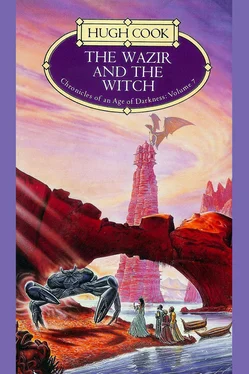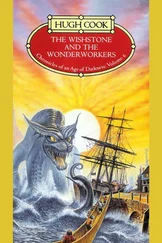Hugh Cook - The Wazir and the Witch
Здесь есть возможность читать онлайн «Hugh Cook - The Wazir and the Witch» весь текст электронной книги совершенно бесплатно (целиком полную версию без сокращений). В некоторых случаях можно слушать аудио, скачать через торрент в формате fb2 и присутствует краткое содержание. Жанр: Фэнтези, на английском языке. Описание произведения, (предисловие) а так же отзывы посетителей доступны на портале библиотеки ЛибКат.
- Название:The Wazir and the Witch
- Автор:
- Жанр:
- Год:неизвестен
- ISBN:нет данных
- Рейтинг книги:5 / 5. Голосов: 1
-
Избранное:Добавить в избранное
- Отзывы:
-
Ваша оценка:
- 100
- 1
- 2
- 3
- 4
- 5
The Wazir and the Witch: краткое содержание, описание и аннотация
Предлагаем к чтению аннотацию, описание, краткое содержание или предисловие (зависит от того, что написал сам автор книги «The Wazir and the Witch»). Если вы не нашли необходимую информацию о книге — напишите в комментариях, мы постараемся отыскать её.
The Wazir and the Witch — читать онлайн бесплатно полную книгу (весь текст) целиком
Ниже представлен текст книги, разбитый по страницам. Система сохранения места последней прочитанной страницы, позволяет с удобством читать онлайн бесплатно книгу «The Wazir and the Witch», без необходимости каждый раз заново искать на чём Вы остановились. Поставьте закладку, и сможете в любой момент перейти на страницу, на которой закончили чтение.
Интервал:
Закладка:
Tok-tok-thuk! Tok-tok-thuk…!
Tok — tok — toketa — toketa — toketa — tok!
Will they not stop that infernal noise? Will they not But enough of this atmospheric backgrounding! It is totally irrelevant to our present purpose, which is to introduce Master Ek into this history; and the reason it is irrelevant is that Nadalastabstala Banraithanchumun Ek heard those drums not at all.
Not because he was deaf.
But because the drums were not there to be heard.
Not where he was.
And where was he?
Why, he was exactly where we would expect to find him; which is to say, he was in his house on Hojo Street, that road which follows the line of Pokra Ridge. That thoroughfare was the site of Injiltaprajura’s prime real estate. Naturally the pink palace is there. Also, Aquitaine Varazchavardan had a villa there. And a great many temples were there located. And adolescent drummers were not to be found anywhere along that road, for temples and villa-keepers alike had servants with sticks who were quite prepared to sally forth to assault any drummer should a single ‘tok — tok — tuk’ or ‘tok — tok — thuk’ be heard.
So, while it is disappointing to have to abandon the attractively melodramatic line which we began to develop so nicely above, the historian must favour truth over drama; and the fact is that Master Ek was singularly untroubled by drums or by drummers. First, because there was none to be heard anywhere near his house. And second because, if the truth be told, Ek rather liked drums; and, when they were to be heard, Ek found their rhythms comforting rather than disturbing.
So we must seek elsewhere for the source of Ek’s discomfort.
After seeking elsewhere, the historian presents the world with the following datum: the proximate cause of the discontent experienced by Nadalastabstala Ban-raithanchumun Ek was the Empress Justina’s undisturbed enjoyment of life, health and liberty.
‘The female Thrug is a witch.’
So said Master Ek, whose audience consisted of selected members of Injiltaprajura’s Cabal House. These individuals listened with every appearance of attentive respect; and in this case appearances were not at all deceptive. Ek was not a prepossessing figure, for he was a gnarled and diminutive man with age-twisted features and hunched shoulders; nevertheless, he was one of the most dangerous power brokers on Untunchilamon, and hence was comfortably seated while the sorcerers stood before him like supplicants or penitents.
‘Not only is she a witch,’ continued Ek, ‘she is monstrous in her habits and her appetites.’
While Ek did not specify the object of his displeasure, all knew that he referred to Justina Thrug, and not to her libidinous twin sister Theodora.
‘She must,’ continued Ek, ‘be killed.’
The assembled sorcerers received this in silence. Their apparent apathy was encouraged by the stifling heat of the day. The end of the Long Dry had been marked by the advent of strenuous winds, which on some days had reached gale force; but today there was no wind but for a shuffling waffling breeze which merely served to shunt the air from one corner of the room to the next.
The room in question was large and high-gabled; it occupied the entire upper storey of Master Ek’s mansion atop Pokra Ridge, and afforded outlookers with the most marvellous views. Today nobody had any appetite for those views.
‘If no action is taken against the female Thrug,’ said Ek, ‘then Aldarch the Third will no doubt display his displeasure in due course. It is known that inertia annoys him. This is but one of the reasons why the Thrug must be killed.’
‘Do you order as much?’ said one of the wonderworkers from the Cabal House.
A foolish question, which Master Ek did not bother to answer. He was not going to order anyone to murder the Thrug. Not when the Hermit Crab might take exception to such orders. The misfortune which had befallen Dui Tin Char lay some time in the past; Tin Char’s dislocated shoulders were once again functional. Nevertheless, nobody had forgotten what had been done to the head of the Inland Revenue. And tales of people who had in the past been turned inside out were also fresh in the minds of Injiltaprajura’s inhabitants.
‘There is,’ said another of the sorcerers, ‘the matter of the protector who guarantees Justina’s flesh.’
This was of course an oblique reference to the dangers posed by the Crab.
‘Forgive me if I am mistaken,’ said Ek, ‘but I have heard that the Thrug’s protector lives on the island of Jod. Unless my informants are mistaken, its primary interest in life is its belly. Apart from that, it wishes only solitude and silence. Are those modest needs so difficult to guarantee?’
‘If I may venture to say so,’ ventured one of the bolder sorcerers, ‘the Crab is not amenable to bribery.’
‘What I meant,’ said Ek, ‘is that it displays remarkably little curiosity. It has no spies and agents. It receives no reports. It listens to no gossip. It eats. It meditates. One may presume it also defecates. That is the sum of its existence.’
‘So?’
‘Are you familiar,’ said Ek, ‘with the principle of quarantine?’
He smiled, showing black teeth. Then he fumbled with a small and equally black pouch. His gnarled, arthritic fingers opened it with difficulty and extracted a quantity of tobacco, an addictive narcotic herb personally imported by Ek at immense expense. The Janjuladoola grey of his fingers, darkened already by liver spots, was further stained with the yellow-orange of nicotine, one of the minor symptoms of this rare addiction.
‘Do you propose…’
So began one of the wonder-workers, but a look from Master Ek silenced him. Ek wished to propose nothing. He desired the wonder-workers to do their own thinking; he sought to avoid taking explicit responsibility for generating Crab-defeating stratagems, lest the Crab some day call him to account for his misdemeanours.
Ek rolled himself a ‘cigarette’, which is a quantity of tobacco compressed by finger-strength and rolled in a tube of paper. Standing by Ek’s chair was a tri-table, one of the notoriously rickety and unstable pieces of furniture favoured by Janjuladoola culture; this civilization considers the gross bulk of the earth to be unclean, hence scorns any object which is or which appears to be solidly rooted to the earth. Atop the tri-table was a casket of green bamboo. Ek opened this, withdrew a hot coal with a pair of soot-tipped tweezers, blew upon the coal until it glowed cherry-red, then lit his cigarette.
While Master Ek smoked, the wonder-workers considered the possibility of placing the island of Jod under quarantine. It was certainly not impossible. A quarantine would cut off all news to the Crab; and, providing its suspicions were not aroused, those forces loyal to Aldarch Three could do as they wished with the monstrous Thrug.
‘One anticipates,’ said one of the sorcerers carefully, ‘that meticulously planned quarantine regulations could resolve many of our present difficulties.’
‘However,’ said another, ‘there is a danger that a certain person will escape justice before such quarantine measures could be put in place.’
Ek smoked impassively. A casual observer might have thought that the nicotine of his addiction had somehow succeeded in staining his eyes, for these were a pale orange strangely flecked with green. However, this oddity had a genetic foundation. Ek was a mutant, though his divergence from the Janjuladoola norm began and ended with his eyes. He had never passed on this trait, and indeed was doomed to die without progeny; which was unfortunate, since those eyes had proved their superiority by retaining their acuteness right into his old age.
(Ek was seventy. Is this old age? His flesh would answer in the affirmative. And, while many of the old complain that they inwardly feel as fresh as they did at twenty, Ek himself felt worn, weary and infinitely ancient.)
Читать дальшеИнтервал:
Закладка:
Похожие книги на «The Wazir and the Witch»
Представляем Вашему вниманию похожие книги на «The Wazir and the Witch» списком для выбора. Мы отобрали схожую по названию и смыслу литературу в надежде предоставить читателям больше вариантов отыскать новые, интересные, ещё непрочитанные произведения.
Обсуждение, отзывы о книге «The Wazir and the Witch» и просто собственные мнения читателей. Оставьте ваши комментарии, напишите, что Вы думаете о произведении, его смысле или главных героях. Укажите что конкретно понравилось, а что нет, и почему Вы так считаете.












